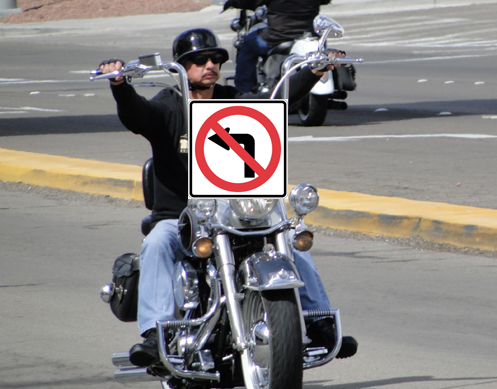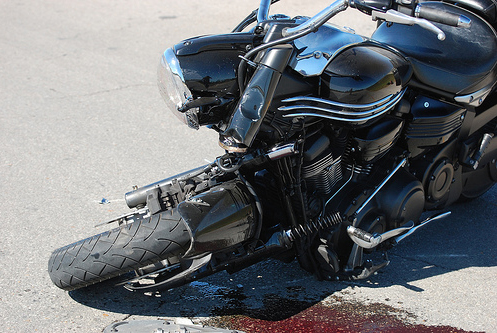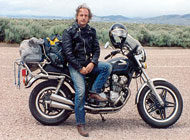Fighting The ‘Motorcycle Crash’ Syndrome
Monday, October 12th, 2015
Considering how many motorcyclists are hurt or killed by people turning left in front of them, maybe we should all put these signs on our bikes.
I mentioned how I have launched my own small campaign against headline writers who describe crashes that involve a motorcycle and another vehicle, even if the driver of the other vehicle was at fault, as a “motorcycle crash.” It seems pretty consistently that my Google Alert for “motorcycle” brings up about two of these offenders nearly every day. So I send about two of my emails every day. I also decided it made sense to send emails expressing approval when headlines are written accurately, in order to let people know someone cares and appreciates their efforts. I don’t often get responses but in some cases I do. I want to share some of those conversations with you here.
Initially I was sending this message: Hi. Just want to ask/raise the point: Why does your headline refer to a “motorcycle crash” when it was in fact a car/motorcycle crash and it was the car driver who was at fault? Aside from being simply inaccurate, this is totally common and gives the misleading impression that motorcycles are dangerous, when in fact the danger is with the car driver. The number one cause of injuries to motorcyclists is cars turning left in front of the bikes.
Predictably, I got some responses from the writer saying an editor wrote the headline, not them.
Dan Sokil, The Reporter: Hi Ken – thanks for the feedback! I actually did not write that headline, all I filed was the text from the scene and my editor entered it into our system, and there has been no official word from police yet about the cause or who was at fault. My editor who wrote that headline is in later this afternoon if you’d like to contact her, but my guess is that was meant to convey that the motorcycle riders were hurt and not the auto ones. Let me know if you’d like to talk to her, and as soon as we have more info we’ll update that story accordingly.
I told Dan I didn’t need to speak with his editor but would appreciate his passing my concerns along.
I also got this from Tara Becker at the Quad-City Times: Hi Ken…thank you for your email. I’m not sure who wrote the headline on the story, but I will pass along your concerns to my editor.
To a third similar response I replied: Perhaps you might make my point to your editor on the basis that it inaccurately presents the accurate story you wrote.
This reporter replied that he did speak with his editor and he thanked me for pointing it out.
Next was Brian Day, with a newspaper group in the Los Angeles area.
Brian: The description of “motorcycle crash” is not intended to assign fault or imply motorcycles are inherently dangerous, it it simply a description of how Mr. Gomez died. It is not an inaccurate description. To say the incident the rider died in a “car crash” or “SUV crash” would be inaccurate and only create confusion, as obviously, Mr. Gomez was riding a motorcycle at the time, he was not driving a car. Saying someone is in a motorcycle crash does not imply, in any way, that they are at fault. Merely that they were riding a motorcycle, which was involved in a crash.
As far as the cause of the crash, police are yet to determine which party is at fault. “The investigation is ongoing,” as my story states. It’s premature at this point to say the woman driving the SUV was at fault in the collision. While the involved SUV is believed to have made a left turn in front of the motorcycle, the cycle was also described by authorities as travelling at high speed.
I certainly understand your feelings, and I hope you find this explanation satisfactory. Take care.
Me: Thanks for responding Brian. I’m particularly interested in your comment about it being a motorcycle accident because he was on one. That’s a little different perspective than I had been using. Still, considering that it was a multi-vehicle accident I think to refer to it only in terms of what the dead guy was on still is less than fully accurate.
Also this from Stephen Frye at the Oakland Press: Thank you for the note. The use of motorcycle in the headline of this story was due to the fact that the driver of the motorcycle was injured and the story was about him being hurt.
Not at all satisfied by those answers, I replied to Stephen: Thanks for the reply but let me ask you this: If the car had hit a toddler on a tricycle would you have referred to it as a tricycle crash? Omitting mention of the car makes it look like the biker just crashed all by himself.
Stephen offered this follow-up response: In that case, I would have mentioned the toddler, which is key to the story. In this story, the key element is the motorcyclist, who was hurt, and the secondary element was that he was from our area, Milford. Rather than say Milford motorcyclist, I broke that up to say a former Milford man was hurt, making the motorcycle part of the crash a secondary part of the headline. Thanks for sharing your input. Many considerations go into the headlines and it is a challenge to convey key details of a story in as brief a way as possible.
I had a good bit of back and forth with DeAnn Smith, Digital Content Editor with KCTV5. First she had this to tell me: We initially were told that it was a single vehicle crash involving a motorcycle. I have no idea what occurs in most crashes but in this case the car driver wasn’t at fault. In this case, the danger was from a motorcycle that didn’t operate properly.
I replied: So you’re never glad to hear someone got hurt or killed but at least it was not the driver at fault. In the vast majority of cases it is.The number one cause of motorcycle fatalities is drivers turning left in front of a biker. The standard explanation: I didn’t see him. Well, maybe you didn’t look, or maybe you were fooling with your cellphone. My main point, however, was that in many, many instances the headline calls it a “motorcycle accident” even if it involved a car and even if the driver, not the rider, was at fault. I’ve initiated my own small campaign to bring this idea to the consciousness of the people writing the headlines–and I know it is not always the reporter who writes the headline. So hopefully I’ve brought it to your attention sufficiently that if you find yourself in that situation in the future you will think about what I’ve said. Thanks.
And she replied: My brother was in two motorcycle crashes. He nearly died in the second one. Both were his fault.
And of special interest was the response I got from Wayne Roustan, at the Sun-Sentinel, when I thanked him for a good headline: Thanks for the feedback. Ironically, later that day, on my way home, on the flyover ramp connecting westbound I-595 to southbound I-75, I was nearly run off the road and into the concrete barrier wall by two guys driving an estimated 80 mph (at least) on motorcycles speeding between the two lanes of traffic that was going about 55-60 mph. The first guy cleared my mirror by inches before I swerved to the right.
It’s about the 10th time this has happened to me. I’ve videotaped a couple on my dashcam, but not this latest one. Back in 2009, I was westbound on I-595 alone at 2 a.m. when a white ninja bike came up on me from behind doing about 100 mph before passing me. Scared the crap out of me. I remember it because the rider was wearing white leathers and a white helmet. The next night one of my videographers brought me videotape of a crash from the same stretch of I-595 going eastbound. A car was rear-ended and burst into flames. The driver survived but the biker didn’t. The video showed debris of a white ninja motorbike and an FHP trooper was carrying a white helmet and white jacket.
I don’t know if it was the same biker who buzzed me the night before but…
So, I’m thinking it goes both ways and there’s plenty of blame to go around.
That pretty well sums up the response I’ve had so far. I intend to continue my campaign. It may make a tiny difference. I’ll pass along anything particularly interesting that comes out of it.
Biker Quote for Today
Squids: Cleaning up the gene pool one wheelie at a time.

